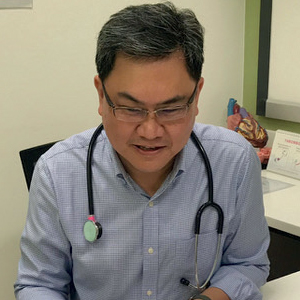THANK YOU FOR SUBSCRIBING

WEB Biotechnology: Timely Medical Care through Fluid and all-digital ECG Data Solution

 Dr. Philip Wong, Founder & Medical Director
Dr. Philip Wong, Founder & Medical DirectorConceived to provide cardiac arrhythmia patients with a better experience to reaching a diagnosis with complaints such as fainting or fast heart beats, WEB Biotechnology’s Spyder ECG helps patients and physicians to connect and improve ambulatory cardiac care outside the hospital. “The Spyder Sensor is an extremely small form factor, highly portable, and completely self-manageable solution, allowing full mobility during the diagnostic or monitoring phase,” says Dr. Philip Wong, Founder and Medical Director of WEB Biotechnology. The wireless transmission of data through the smartphone paired with Spyder allows ‘real-time’ and direct patient to database transmission of all ECG data.
There is therefore complete liquidity of ECG data that transcends large geographical distances, providing real-time fluid data between patients and doctors, across the globe.
WEB Biotechnology’s solution has helped to accurately detect dangerous cardiac arrhythmias such as Atrial Fibrillation (AF)—a debilitating condition that increases the risk of stroke and may leave the patient paralyzed. This abnormal rhythm is common in the elderly and sometimes starts in a short burst of less than 5 minutes, making traditional short-term and event monitors miss the arrhythmia when it occurs. In Dr. Wong’s experience, there are patients who after wearing the sensor for two weeks have AF detected on the last day before the return of the device. “This will most certainly be missed if a traditional wired system or an event ECG monitor is used,” says Dr. Wong. The medical-grade Spyder (CE-Marked and HSA Singapore approved) therefore significantly outperforms wrist-worn ECG monitors, which only can transmit data when the individual is awake or feels symptoms.
Data security is an increasing and formidable challenge to any data pool, and wireless solutions especially are more vulnerable to cyberattacks. WEB Biotechnology deploys firewalls and multi-tier barriers to providing data encryption and patient anonymization in the database. “Our solution is medically regulated and clinically proven with over 40,000 Holter day sessions in our database so far,” says Dr. Wong. As this database continues to grow exponentially, WEB Biotechnology is beginning to deploy AI to help early detection of abnormal trends in cardiac rhythms. “Our proprietary platform, built on ‘Hub and Spoke’ architecture, is stable and proven, and we are extending it to other areas of unmet clinical needs such as ambulatory maternal labour monitoring.”
With a motto to ‘simplify life’, the company continues to use digital and wireless technologies to make diagnosis and treatment easier, faster and more cost effective for patients. WEB Biotechnology is currently enhancing the backend analysis platforms with AI and other algorithms for medical use; simultaneously, it is exploring the use of blockchain technology to archive data as its database grows exponentially. “We leverage advancing sensor technology to develop new sensors that are more compact and cost-effective to use, and to help patients in all walks of life,” concludes Dr. Wong. As it is, any individual with a connected smartphone is able to utilize WEB’s Spyder ECG technology.
WEB Biotechnology’s solution has helped to accurately detect dangerous cardiac arrhythmias such as Atrial Fibrillation (AF)—a debilitating condition that increases the risk of stroke and may leave the patient paralyzed. This abnormal rhythm is common in the elderly and sometimes starts in a short burst of less than 5 minutes, making traditional short-term and event monitors miss the arrhythmia when it occurs. In Dr. Wong’s experience, there are patients who after wearing the sensor for two weeks have AF detected on the last day before the return of the device. “This will most certainly be missed if a traditional wired system or an event ECG monitor is used,” says Dr. Wong. The medical-grade Spyder (CE-Marked and HSA Singapore approved) therefore significantly outperforms wrist-worn ECG monitors, which only can transmit data when the individual is awake or feels symptoms.
Data security is an increasing and formidable challenge to any data pool, and wireless solutions especially are more vulnerable to cyberattacks. WEB Biotechnology deploys firewalls and multi-tier barriers to providing data encryption and patient anonymization in the database. “Our solution is medically regulated and clinically proven with over 40,000 Holter day sessions in our database so far,” says Dr. Wong. As this database continues to grow exponentially, WEB Biotechnology is beginning to deploy AI to help early detection of abnormal trends in cardiac rhythms. “Our proprietary platform, built on ‘Hub and Spoke’ architecture, is stable and proven, and we are extending it to other areas of unmet clinical needs such as ambulatory maternal labour monitoring.”
With a motto to ‘simplify life’, the company continues to use digital and wireless technologies to make diagnosis and treatment easier, faster and more cost effective for patients. WEB Biotechnology is currently enhancing the backend analysis platforms with AI and other algorithms for medical use; simultaneously, it is exploring the use of blockchain technology to archive data as its database grows exponentially. “We leverage advancing sensor technology to develop new sensors that are more compact and cost-effective to use, and to help patients in all walks of life,” concludes Dr. Wong. As it is, any individual with a connected smartphone is able to utilize WEB’s Spyder ECG technology.

I agree We use cookies on this website to enhance your user experience. By clicking any link on this page you are giving your consent for us to set cookies. More info













